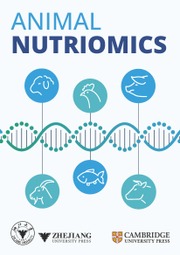In the past few decades, the incorporation of molecular biology and omics-based technologies in the field of animal nutrition has accelerated our understanding of animal science. The emergence of such molecular nutrition has opened up new fields in nutrition, genetic and epigenetic regulations in animal physiology, metabolism, and many biological processes that can directly or indirectly influence animal growth and production, animal health and welfare, and product quality.
The term “nutriomics” (or “nutrigenomics” or “nutrition genomics”) is often used in the context of personalized medicine and health for humans. The field basically focuses on the interaction between nutrients and genes: how the constituents of food can affect metabolism through altering the transcription and translation of genes. In the context of animal husbandry, nutriomics research refers to the understanding of how animals respond to feeding management at the molecular level, with implications not only for efficiency and productivity but also for animal health. Thus, this developing research field has important implications for food-producing animals and agricultural production globally and is essential for supporting the next century’s food security and humanity. To facilitate these tasks, Animal Nutriomics (ANO), a new open access journal, is coming to the stage. It will not only serve as a worldwide platform for animal scientists, nutritionists, physiologists, and researchers in animal nutrigenetics and nutrigenomics to present their research achievements but also share their dynamic developments and innovations in this discipline, which will ultimately benefit farm and industry practitioners.
The scope of ANO will be broad. The contents should be related to livestock, aquatic, and laboratory animal species that address fundamental questions. Subject areas may include but are not limited to
- Animal molecular nutrition
- Animal nutrigenomics and nutriepigenomics
- Phenotype and nutrient metabolism at the molecular level
- Animal and food microbiomes for animal production and health
- Nutritional epidemiology and molecular regulation of animal health
- Nutritional regulation of animal growth, development, and product quality
- Feedomics and foodomics
- Exploration of novel nutrients or feed additives for animal production and health
- Nutrigenetic basis of animal nutrition
- Functional omic bases of nutrition and reproductive physiology
- Advances in multiomics research and methods in animal sciences, etc.
As an international open access journal, ANO will publish impactful research articles, insightful reviews, short communications, commentaries, etc. All submissions undergoing rigorous peer review according to the highest global standards and obey the ethics. The journal will focus on the key scientific issues of animal nutrition development, explore the underlying mechanisms and principles of animal nutrition, and showcase the latest research, new technologies, new methods, and new products in the fields of animal molecular nutrition, nutritional transcriptomics, and metabolomics. Ultimately, these researches will not only improve production but also ensure animal health and food safety.
ANO is owned by Zhejiang University and Zhejiang University Press and is published by a leading publisher, Cambridge University Press. We are greatly honored to become the Editors-in-Chief of this exciting new journal. It is highly desirable to welcome you to the first edition of the ANO. Peer review remains a vital component of our assessment of submitted articles. We will manage the review process through an effective and active editorial office. Our editorial board, composed of experienced, energetic, and promising scholars, will organize and manage to provide careful, detailed, and helpful reviews of the manuscripts.
We sincerely invite your contributions to make ANO a truly prestigious international journal. To distinguish ANO from other journals, we will provide a rapid review response to our authors. Submission is online, and the review process is streamlined to provide rapid turnaround times. Accepted manuscripts will immediately be posted on the website of the journal, allowing readers to view the papers as soon as possible, which will significantly expand the distribution of its contents. We will also have special issues led by prominent scientists. We are keen to receive your submissions and welcome your ideas and comments for ANO.
We look forward to working with our editorial team, our reviewers, and authors, together with Zhejiang University Press and Cambridge University Press to ensure the growth and success of ANO.
Conflicts of interest
The authors declare that they have no known competing financial interests or personal relationships that could have appeared to influence the work reported in this paper.


